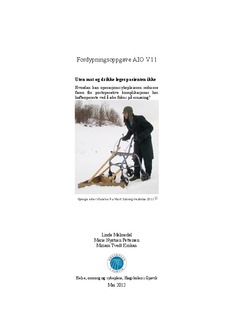| dc.contributor.author | Malmedal, Linda | |
| dc.contributor.author | Pettersen, Marie Nystuen | |
| dc.contributor.author | Krokan, Miriam Tvedt | |
| dc.date.accessioned | 2012-07-02T06:42:54Z | |
| dc.date.available | 2012-07-02T06:42:54Z | |
| dc.date.issued | 2012 | |
| dc.identifier.uri | http://hdl.handle.net/11250/144533 | |
| dc.description.abstract | NORSK: Litteraturstudien har vist at proteiner, ernæringstilskudd og oppfølging av dietetiker er viktig for eldre pasienters utfall etter hofteoperasjon. Operasjonssykepleierens funksjonsbeskrivelse samt gjeldende lovverk er drøftet opp mot hvilke tiltak operasjonssykepleieren kan iverksette for å redusere faren for postoperative komplikasjoner hos denne pasientgruppen. Oppgaven argumenterer for at det også er operasjonssykepleierens anliggende å fokusere på ernæring. Operasjonssykepleieren må kunne identifisere, kartlegge, planlegge, iverksette tiltak og evaluere egen praksis for å ivareta den eldre pasienten som er i fare for underernæring eller er underernært. Konklusjon: Artiklene i litteraturstudien viste at pasientenes utfall etter endt hoftebruddskirurgi resulterte i færre postoperative komplikasjoner dersom pasientene var godt ernærte, preernærte eller fikk ernæringstilskudd pre- og postoperativt. Vårt forslag er previsitt gjort av operasjonssykepleiere. Her kan vi tilrettelegge for god kommunikasjon med sengpost, henvise til dietetiker og følge opp kartleggingen med tiltak som proteinrik kost og ernæringstilskudd. | no_NO |
| dc.description.abstract | ENGELSK: Our literature study shows that proteins, nutritional supplements and monitoring of the dietician is important for geriatric patients’ outcome after hip surgery. We discuss the operating nurse’s functional description and applicable law in regards to the actions nurses can take in order to reduce the risk of postoperative complications in this patient group. The thesis argues that operating nurses also must focus on nutrition. Operating nurses should be able to identify, map, plan, implement and evaluate their own practices in order to safeguard the older patients who are at risk for malnutrition, or malnourishment. Conclusion: The articles in the literature study show that the patients outcome after hip fracture surgery resulted in fewer postoperative complications if the patients were well nourished, pre-nourished or received nutritional supplements pre- and postoperatively. We propose that a pre-visit by the operating nurse at the ward may facilitate good communication with the bed post and referral to a dietician in addition to surveying the nutrition and suggesting measures like protein-rich diets and nutritional supplements. | no_NO |
| dc.language.iso | nob | no_NO |
| dc.subject | operasjonssykepleie | no_NO |
| dc.subject | ernæring | no_NO |
| dc.subject | postoperative komplikasjoner | no_NO |
| dc.title | Uten mat og drikke leges pasienten ikke: hvordan kan operasjonssykepleieren redusere faren for postoperative komplikasjoner hos hofteopererte ved å øke fokus på ernæring? | no_NO |
| dc.title.alternative | Without food and drink the patient does not heal: how can the operating nurse reduce the risk of postoperative complications by increasing the focus on nutrition to the hip surgery patient? | no_NO |
| dc.type | Student paper, others | no_NO |
| dc.subject.nsi | VDP::Medical disciplines: 700::Health sciences: 800::Nursing science: 808 | no_NO |
| dc.source.pagenumber | 61 | no_NO |
